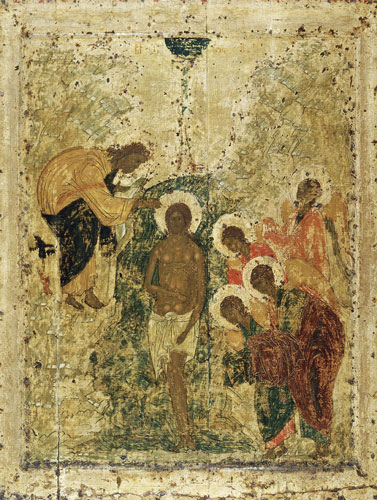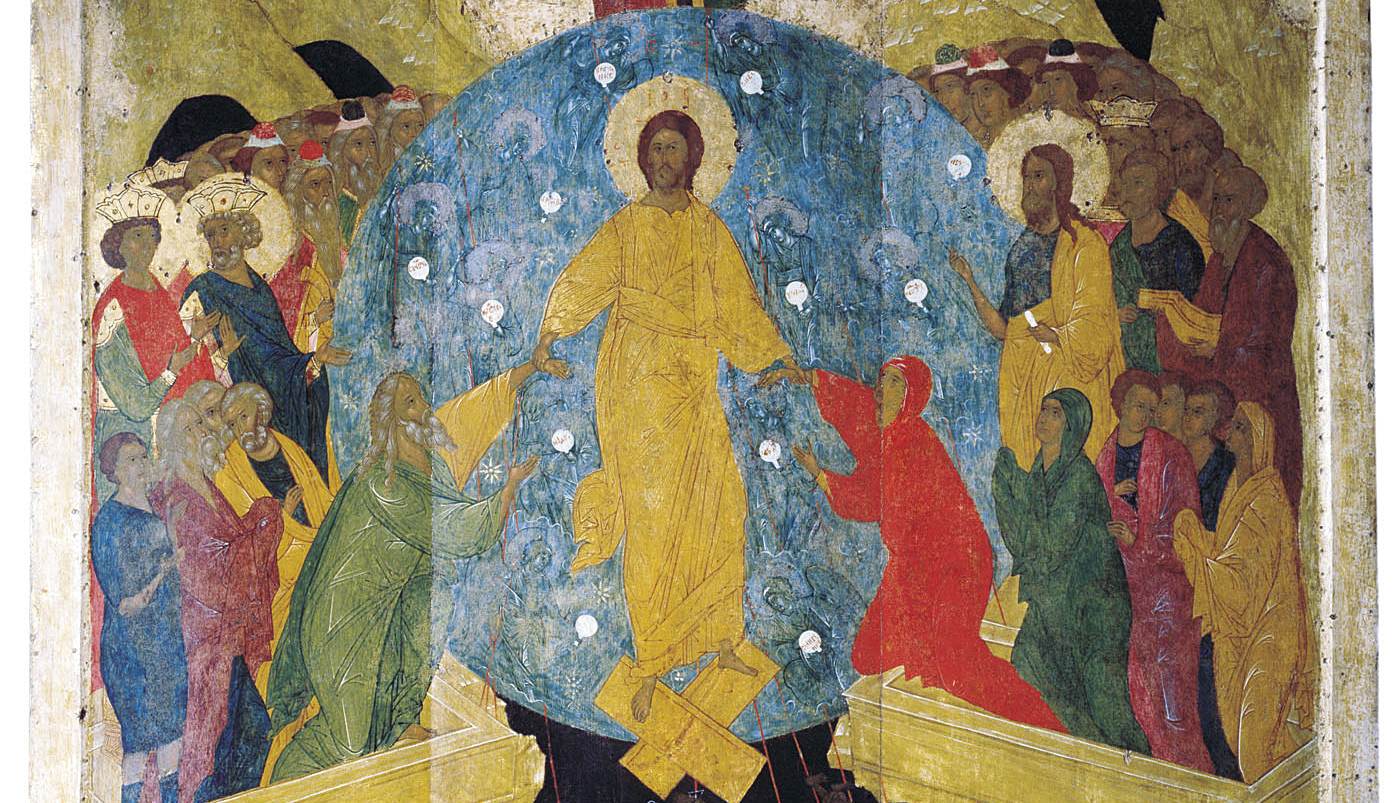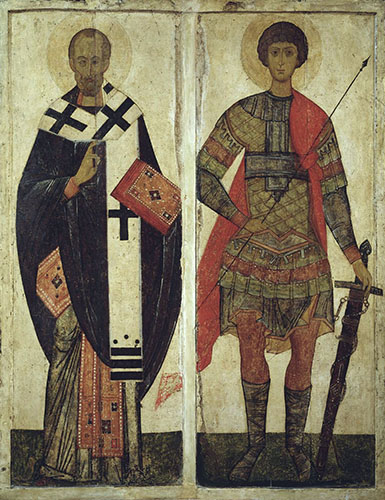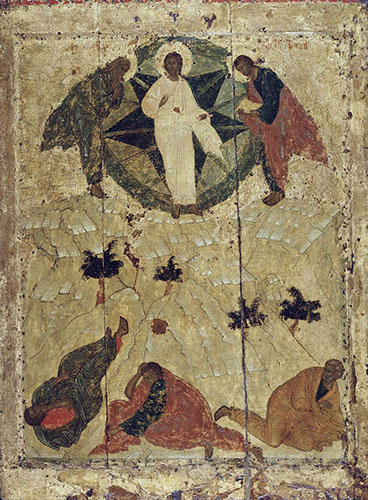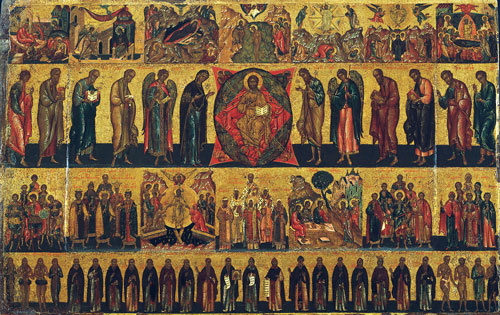Placidas arose from the ground, but he saw no one. He cried out, 'Now, O Lord, do I believe that Thou art the God of heaven and earth and the Maker of all creation. Thee alone do I worship, and henceforth I desire to know no God other than Thee.'
One day, as Placidas was hunting together with his servants, as was his custom, he came upon a herd of deer. Having pointed them out to the horsemen accompanying him, he set out in pursuit. Picking out the largest deer in the group, he chased after it, and the deer became separated from the herd. The servants followed Placidas, but their horses became exhausted, and they were left behind. Placidas, whose horse was the fastest, pursued the deer alone far into the wilderness. After he chased the deer for a long time, it climbed atop a great rock and stood there. Placidas drew near and looked at it, considering how he might take the deer. But the compassionate God, Who in various ways effects a man’s salvation and by means which He alone knows sets him upon the true path, ensnared the hunter. He manifested Himself, not through the agency of another as He did to Cornelius through Peter, but directly, as He did to Paul. Placidas remained for a long time gazing at the deer, and Christ the Lord appeared to him in a vision. A most radiant cross appeared between the deer’s antlers, and as Placidas gazed upon it, he beheld the likeness of Jesus Christ, Who was crucified for us. He was astonished by this strange Vision, and he heard a voice saying to him, “Why do You pursue Me, O Placidas?”
As soon as he heard this divine voice, Placidas was Stricken with fear, and he fell from his steed to the ground and lay as though dead. When he came to himself somewhat, he said, “Who art Thou, O Lord, that speakest to me?”
The Lord said unto him, “I am Jesus Christ, Who being God clothed Myself in flesh for the salvation of man, underwent suffering willingly, and bore crucifixion. Even though you do not know Me, you honor Me by your good works, and your many alms are like a fragrant sacrifice coming up before Me, and I Wish to save you. Therefore, I have appeared to you from above this beast, that I might bring you to know Me and unite you to My faithful servants. I do not desire that a man who works deeds of righteousness should perish in the snares of the foe.
Placidas arose from the ground, but he saw no one. He cried out, “Now, O Lord, do I believe that Thou art the God of heaven and earth and the Maker of all creation, Thee alone do I worship, and henceforth I desire to know no God other than Thee. Wherefore, I pray Thee, O Lord, shew me what I am to do.”
And again he heard a voice, saying, 'Go to a Christian priest and be baptized, and he shall indicate to you the path to salvation'
When Placidas heard these things, he was filled with joy and compunction, and he fell to the ground in tears and worshiped the Lord Who had appeared to him. He was sorrowful that until now he had not perceived the truth and had not known the true God, but he rejoiced in spirit that he had been deemed worthy of grace and had been brought to the knowledge of the truth and set upon the path of righteousness. Mounting his steed, he returned to his company, his spirit joyful, but he told no one what had occurred. When Placidas returned from the chase, he took his wife aside and related to her all that he had seen and heard. She said, “Last night, I heard someone say to me, ’In the morning you, your husband, and your sons will come to know Me, Jesus Christ, the true God, Who bestows salvation upon those who love Me.’ Therefore, let us not wait but rather hasten to do that which we have been commanded.”
That night, Placidas ordered that the house be found where the Christian priest lived. Having learned where his house was, Placidas took his wife and children and several of his devoted servants and went to the priest, whose name was John. He related in detail everything concerning how the Lord had appeared to him, and he asked to be baptized. When the priest heard these things he glorified God, Who calls from among the nations those who are pleasing to Him. He instructed them in the holy faith and told them of all God’s commandments. When he had taught them sufficiently and prayed, he baptized them in the name of the Father and of the Son and of the Holy Spirit. Placidas was given the name Eustathius in Holy Baptism, and his wife the name Theopiste, and to their sons the names Agapius and Theopistus were given. The priest communed them of the divine Mysteries and dismissed them in peace, saying to them, “May God be with you, and may He enlighten you with divine knowledge He has summoned you to the inheritance of life eternal; therefore, when you are deemed worthy to behold Him, remember me, your spiritual father.”
Thus having been born again in the font of Baptism and filled with unutterable joy, they departed to their home. The grace of God illumined their souls and filled their hearts with such sweetness that it seemed to them that they were not on earth but in heaven.
The next morning, Eustathius mounted his horse, and having taken a few of his servants, he made as though he were setting out on a hunt. He went to the place where he has seen the Lord, that he might render thanks there to Him for his inexpressible benefactions. When he arrived at that place, he sent forth his servants, saying, “Go in search of game.” He then dismounted, fell upon his face on the ground, and prayed, weeping and thanking God for His unutterable mercy, in that He chose to enlighten him and his family with the light of faith. He committed himself to his Lord and cast himself upon His good and perfect will, trusting that according to God’s goodness, in a way known to Him and pleasing to Him, he would dispose all things in a profitable manner.
